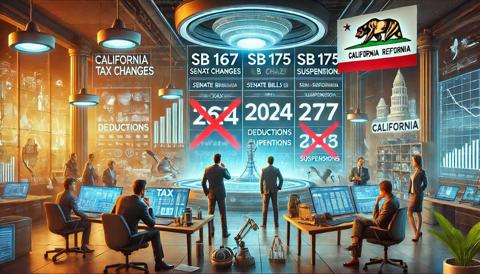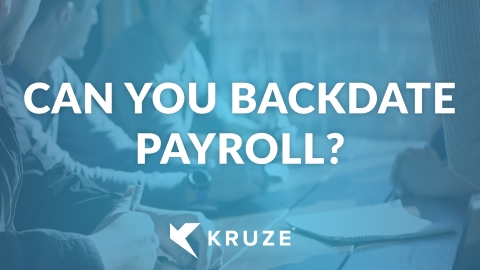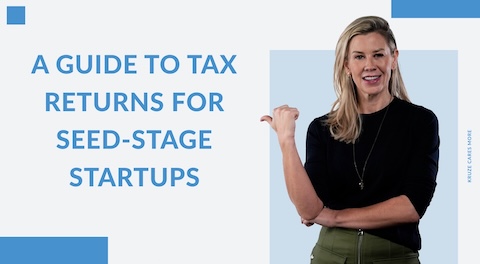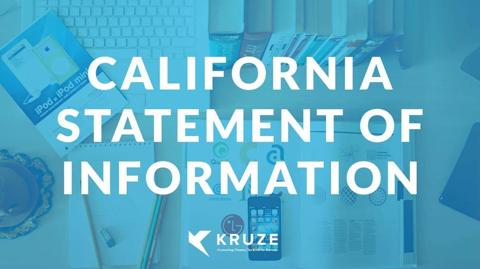
Saas sales taxes - they matter more than ever for startups. Here is what you need to know if your company is selling products or services in multiple states.
Why do startups need to care about Saas sales taxes and tax nexus?
Even money losing, early-stage companies may owe Saas sales taxes. This becomes even more of an issue if your company has remote employees in many states, and as you have a greater number of “transactions” and revenue from various locations.
Map of Saas Sales Taxes for Startups
The information below is specific to Sales Tax registrations and separate from state registrations. The data on specific Saas sales tax rates, thresholds and applicability is for illustrative purposes only, and should not be relied on to prepare state tax compliance or sales tax calculations - work with a qualified CPA like Kruze Consulting to comply with state and local sales tax rules.
VC-Backed Startups: Contact us for a free consultation.
- Summary of States with Annual Revenue Threshold
- Summary of States with a Sales Tax Transaction Threshold
- Summary of States with No Sales Tax
- Summary of States that include Marketplace Sales in Threshold
- Summary of States that Exclude Marketplace Sales from Threshold
- Summary of States that Tax SaaS Transaction
- Summary of States that Do Not Tax SaaS Transaction
State Tax Nexus
What is State Tax Nexus:
- Tax Nexus describes the relationship between a taxing authority and a business.
- Tax Nexus must exist before a state’s taxing authority can levy a tax on a business.
- A business must have a substantial presence in a State before it creates nexus.
- To determine your business has Tax Nexus in a state:
- Registering to do business in the state
- Physical Presence in the form of Employees, Property, or Assets in a state
- The Supreme Court’s decision in South Dakota vs Wayfair many states enacted economic nexus laws for businesses that generate a material amount of revenue in states even if there is no physical presence in the state!
Tax nexus is the relationship between a taxing authority and a business. The way it goes is a business has to have one before it can be taxed.
So there are a couple of different types of thresholds to establishing a state tax nexus.
The basic idea is you must have a prominent presence in a state. There are a couple of ways for you to check and see if your company has this. The simplest way is just to see if you have a state registration to do business in that particular jurisdiction. The reason for that is when you start conducting business in a state, typically you have to register. The state knows you registered with them; so they are more likely to check on you and make sure you’re filing the right sales tax and tax returns. So that’s the first shortcut.
The more established way is to evaluate whether you have employees, assets, or property in a state. Anyone who’s working in a state will start triggering a state tax nexus.
So for example, if you’re a startup, and you have a W2 employee working in North Carolina, and that W2 employee is renting office space, you are going to start triggering a nexus in North Carolina. That is, that’s a pretty clear cut. It’s a little tougher to determine sometimes if there’s a computer or some very small amount of assets in North Carolina. But, you can pretty much bet that if you have employees in NC, then you are going to have a nexus.
It’s really important to distinguish between employees versus contractors. If they are contractors, and they have their equipment, such as their own laptop, you are not establishing nexus in that state.
Now, in the modern-day, there’s a lot of business conducted over the internet in the form of eCommerce sales, software or SAAS sales, or service sales.
A few years ago, the states realized this and felt like they were missing out. They brought it to the Supreme Court. The case was called Wayfair versus South Dakota, and the Supreme Court ruled in favor of South Dakota. This ruling gave states the ability to tax businesses, even if they didn’t have a physical presence in the state. You can read more on the Supreme Court’s sales tax ruling here.
So all of a sudden, online sales, online software sales, online diagnostic, or some forms of biotech stuff, all of a sudden become taxable if they pass a certain threshold of around $100,000. Of course, this has to be made even more confusing by some states having their sales taxes be based on a different revenue number in that state, or them having a particular number of “transactions” in that state, or a combination of things.
AND, not all states are collecting this type of sales tax. So the sales taxes you owe are really going to be dependent on the specific number of sales, specific states, and the dollar amount of your sales in those locations. It gets confusing fast.
However, if you’re doing business across the United States, and you have some states where you’re getting close to that $100,000 threshold, it’s getting very likely that you have created a tax nexus, and you’ll have to file sales tax returns. You’ll probably also have to file a state tax return.
In closing, the big picture on the tax nexus is that if you’re doing business in a state physically with employees, property, assets, etc. you have most likely triggered the tax nexus. If you’re doing business in the sense that you’re selling a lot of goods or services over $100,000, you have also probably triggered tax nexus.
Kruze’s SaaS Sales Tax Advisory Service (and Tech!)
Kruze’s SaaS Sales Tax Team has the experience and technology to keep SaaS businesses in compliance with complicated Sales Tax regulations. Our process leverages best in class technology to not only assess the current situation, but to also monitor and suggest proactive steps to stay in compliance. Our team will:
- Mapping your SaaS sales tax nexus. We create a comprehensive nexus analysis of your SaaS business, subscription revenue, and user base to determine where you’re subject to sales taxes on a state-by-state basis.
- Create a SaaS sales tax compliance plan. Based on your tax map, we’ll outline the states in which you need to register, register your SaaS startup with the appropriate states, and set up a schedule to file sales tax returns and make payments.
- Resolve any issues with unpaid tax. If your SaaS startup has any existing sales tax issues, we will work with you to address them. Many states have voluntary disclosure programs that offer full or partial amnesty to SaaS companies that are filing for the first time.
- Set up SaaS revenue and invoicing systems. We’ll recommend tools and resources that you can use to stay compliant with SaaS sales tax regulations.
- Monitoring. Our team (and software) will actively monitor your revenue and user base to understand if new filings and tax collections are needed.
- File returns and remit payments. We’ll file your SaaS sales tax returns for the states where you have nexus, and ensure your payments are accurate and on time.
- Track your obligations and adjust as needed. SaaS sales tax laws change and evolve, and your SaaS startup will grow. We will adjust your plan for any changes in existing tax obligations, and work with you to add states as your SaaS sales increase.
If your startup is ready to start making sales or already selling products, it’s important that you prepare to deal with sales taxes. Talk to us today!
At what revenue level should startups worry about Saas sales tax?
At some point your venture capital-backed startup will have to start filing Saas sales tax. When and how much will be different from state to state.
In most states the threshold is $100,000 in annual sales, but that can change. Some states have also set the number at $500,000 while others have chosen $250,000. Smaller states tend to have a lower threshold so they are able to pick up more sales tax revenue.
But typically, most startups are in the danger zone at $100,000. At that point, most startup accountants, like Kruze Consulting, will conduct a sales tax nexus study, which helps you figure out where you have exposure, and when you will need to start filing sales tax.
Also, your revenue level is just one of many factors that will trigger the need to file Saas sales tax.
Let’s take a look at the other factors that can trigger Saas sales tax.
Transactions can trigger Saas sales tax
Surprising to some, but the number of transactions your startup does can also trigger Saas sales tax.
Typically, when a state is looking at transactions, they’re setting the threshold at 200 transactions, which doesn’t seem like a lot.
Your startup accountant will know which states consider revenue and transactions and which states consider revenue or transactions.
For some startups that are selling something at a low price point, they may not realize they’ve triggered the Saas sales tax requirement because they haven’t reached the revenue threshold, but they’ve certainly exceeded that 200 transactions threshold and should be filing.
Marketplace sales can trigger Saas sales tax
For those startups that are running a marketplace business, it’s important to understand whether the state in which they do business is including marketplace sales. If marketplace sales are included, then business owners are only getting like 5-10% value out of a sale.
For instance, if a customer buys a $100 item on your marketplace, you may charge a 5-10% fee to facilitate the transaction. If you are responsible for the sales tax on that item, it can eat up the profit margin pretty quickly.
So it’s important to talk to your startup accountant and be clear on the sales tax rules of the state in which you’re doing business.
SaaS can trigger Saas sales tax
Believe it or not, many states do have a SaaS sales tax.
This is a fairly new thing. A few years ago, there were roughly 13 states that taxed SaaS, and now it’s in the 20s.
More states are looking at different and new types of transactions to tax in order to fill their revenue gaps. SaaS is quickly becoming one of those transactions, especially in bigger states. Both New York and Texas have implemented a SaaS sales tax. You may get a sales tax notice if you are producing a lot of sales in those states.
Understanding SaaS Sales Tax: Navigating Apple and Google App Stores
Sales tax collection for transactions made through Apple’s App Store or Google’s Play Store is generally not the responsibility of startups or individual app developers. In general, according to the terms of service for these platforms, Apple and Google act as the merchant of record and own the customer relationship. This means that they are responsible for calculating, collecting, and remitting the sales tax to the appropriate jurisdictions - which they tend to do quite competently. So if your SaaS app sells 100% through these app stores, you shouldn’t have to worry about sales tax .
However, for companies that also make direct sales in addition to their app store sales, it becomes more complex. The inclusion of marketplace (like App Store or Google Play) sales in the threshold for sales tax nexus depends on individual state laws. Some states may require these sales to be included in the calculations for establishing a sales tax nexus, even though the taxes themselves are being collected by the marketplace. So if an app developer also has direct sales, consult a tax professional like Kruze to understand their sales tax obligations. You may owe taxes on your direct sales!
Get a sales tax nexus study
Given the different rules and laws that govern each state, it’s critical to work with your startup accountant and conduct a sales tax nexus study.
The rules are different from state to state, so be sure you understand your tax obligations and what triggers them.
If you have any questions about startup taxes or want more information on startup accounting, please contact us.
Avalara simplifies complicated startup sales taxes
In the wake of the Supreme Court’s decision in Wayfair v. South Dakota, individual states are now able to tax startups that have a physical presence in their states, as well as startups that sell more than the state’s product or revenue thresholds.
It’s easy to see how this becomes a complex compliance burden to startups. Depending on your sales footprint, you may have to submit tax filings in dozens of states. And every state has different rules and tax thresholds.
At Kruze Consulting, we often recommend our clients use Avalara, a SaaS tax compliance software solution that can track your sales by state, calculate your tax obligations, and even help you submit payments. Avalara’s robust and comprehensive solution connects with more than 1,000 different systems, and it’s great for startups that need to simplify their state tax compliance process
Does your Startup Owe Income Taxes In Another State?
While your startup could owe sales taxes in different states based on the amount of business you do there, you could also owe income taxes. Like sales tax nexus, income tax nexus thresholds differ from state to state. The factors that affect income tax nexus include sales, as well as property or payroll within a specific state. For more information see our state income tax nexus map.
California Sales Tax Partial Exemption
Some biotech and manufacturing startups can save almost four percent on sales and use tax for qualified purchases in California.
How does your startup’s state of incorporation affect taxes?
Sometimes startups might consider changing their state of incorporation to take advantage of different tax breaks. This is different than registering to do business in a state where you have tax nexus. For example, sometimes a startup might want to change states to take advantage of the R&D tax credit for another year. However, that doesn’t work, and changing your state of incorporation is not really a good idea.
Do SAAS Companies Pay Sales Sales Tax?
SAAS sales tax does exist, it’s not just for tangible goods. A couple of years ago various states put into place SAAS sales tax.
So your first question is probably where in the US should I keep in mind that SAAS sales tax exists? And the answer is to go ahead and go to our website, we’ve got a map up there for you. It was created by Taxjar, they’ve done a wonderful job of outlining which states you want to consider for SAAS sales tax.
For example, New York does have a SAAS sales tax, whereas California does not. Next question we usually get is, you know, do I have nexus in that state? Is that sales tax applicable to me? And the answer is do you have nexus in that state? So do you have sales in that state, revenue or payroll? You’re going to want to work with your CPA to figure out whether or not you have a presence in that state and you do need to file.
Next question that we always get is how much is the SAAS sales tax? That really does vary state by state, so for example, Connecticut is about one percent, New York is about eight percent.
The last question we always get is, you know, how often do I have to file? Usually, it’s quarterly, but sometimes it’s monthly.
Of course we recommend that you work with an experienced CPA who know Software as Services businesses. Head over to our SaaS accounting page to learn more about how we’ve successfully served hundreds of these types of startups.
Who Should pay the Sales Tax for SaaS?
Should a SaaS startup add sales tax onto their customer’s bill or absorb the tax themselves?
Here at Kruze we get this question fairly frequently from our startup accounting clients, and most of us think this sales tax should be added onto the customer’s bill. Let’s look at the rules of SaaS sales tax and why we think customers should foot the bill.
How do you Calculate Sales Tax?
There is a number of great systems that will calculate the sales tax for you and simply add it on top of the customer’s bill. These include software engines such as Avalara, TaxJar, and other VC-funded software. A couple of the VC-funded software engines will even do the calculations for you and also look at which state your customers are in so you can collect that data.
Please collect that data! Here at Kruze Consulting we need to know where your customers are, so we can do nexus determinations. It is really important to know where your customers are located, making combining of the collection of data with billing your customers their sales tax a very smart idea.
Why Customers Should Pay for Sales Tax
Sometimes companies will absorb sales tax themselves for a little while. This is often rooted in the sudden collection of revenue at material amounts, and not really knowing what to do at that point. There is also often a concern about a negative response from customers. However, absorbing this sales tax costs your company money.
You’re also setting an unrealistic expectation for your customers. If your startup pays those taxes, your customers may come to expect it, especially if you are a certain size. This means even more money lost as you grow, unless you have an uncomfortable conversation with your customers.
So pass the tax costs on to your customers. It will save you money, and it will help you become compliant and ensure you are doing all your processes correctly.
Don’t Forget to Remit Your Sales Tax
One thing we really stress is that you do not forget to remit the taxes you collect to the government. These will mostly be state agencies.
It is a very serious crime to collect sales tax and not remit it to the proper tax authority. Occasionally, we see companies in onboarding with us who have been collecting sales tax for six months but have never sent the checks to the appropriate government agency. That is a recipe for some serious financial penalties and potentially other charges.
So do not sit on that money. Do not co-mingle it. Get that money out of your bank account and into the government’s hands.
Remember, sale tax means you’re making sales!
It’s always an exciting moment when a SaaS company is big enough to even worry about sales tax. There are thresholds you have to meet and we’ve done a video on that too. You check that out. Or you can check out the Kruze sales tax page.

But remember these three things:
- Add the sales tax to your customer’s bills.
- Collect the data on the sales tax by state for your accounting team.
- Do not forget to remit your sales tax!
If you have further questions on startup bookkeeping, taxes, startup accounting, or even venture capital fundraising please contact us.
Need Saas sales tax help or just want to leave it up to the experts?
We can help you out and can do a study for you. We will parse this figure out if you have triggered nexus and we can take care of all the forms you need to file. Feel free to contact us to learn more.
Massachusetts also offers a sales tax emption for startups conducting research and development in the state (or should we say commonwealth).
Find out if your startup qualifies for the Massachusetts R&D Sales Tax Exemption.
Summary of States with Annual Revenue Threshold
Summary of States with a Sales Tax Transaction Threshold
Summary of States with No Sales Tax
Summary of States that include Marketplace Sales in Threshold
Summary of States that Exclude Marketplace Sales from Threshold
Summary of States that Tax SaaS Transaction
Summary of States that Do Not Tax SaaS Transaction
| State | Annual State Revenue Threshold | Transaction Threshold | Marketplace Sales | SaaS Taxability |
|---|---|---|---|---|
| Alabama (AL) | 250,000 | No transaction threshold | Excluded from threshold | Taxable |
| Alaska (AK) | 100,000 | 200 | Excluded from threshold | Taxable |
| Arizona (AZ) | 100,000 | No transaction threshold | Excluded from threshold | Taxable |
| Arkansas (AR) | 100,000 | 200 | Excluded from threshold | Not Taxable |
| California (CA) | 500,000 | No transaction threshold | Included in threshold | Not Taxable |
| Colorado (CO) | 100,000 | No transaction threshold | Excluded from threshold | Not Taxable |
| Connecticut (CT) | 100,000 | 200 | Included in threshold | Taxable |
| District of Columbia (DC) | 100,000 | 200 | Included in threshold | Taxable |
| Delaware (DE) | This state does not impose sales tax. | N/A | N/A | No Sales Tax |
| Florida (FL) | 100,000 | No transaction threshold | Excluded from threshold | Not Taxable |
| Georgia (GA) | 100,000 | 200 | Excluded from threshold | Not Taxable |
| Hawaii (HI) | 100,000 | 200 | Included in threshold | Taxable |
| Idaho (ID) | 100,000 | No transaction threshold | Included in threshold | Not Taxable |
| Illinois (IL) | 100,000 | 200 | Excluded from threshold | Not Taxable |
| Indiana (IN) | 100,000 | 200 | Excluded from threshold | Not Taxable |
| Iowa (IA) | 100,000 | No transaction threshold | Included in threshold | Taxable |
| Kansas (KS) | 100,000 | No transaction threshold | Included in threshold | Not Taxable |
| Kentucky (KY) | 100,000 | 200 | Included in threshold | Not Taxable |
| Louisiana (LA) | 100,000 | 200 | Excluded from threshold | Not Taxable |
| Maine (ME) | 100,000 | 200 | Excluded from threshold | Taxable |
| Maryland (MD) | 100,000 | 200 | Included in threshold | Taxable |
| Massachusetts (MA) | 100,000 | No transaction threshold | Excluded from threshold | Taxable |
| Michigan (MI) | 100,000 | 200 | Included in threshold | Not Taxable |
| Minnesota (MN) | 100,000 | 200 | Included in threshold | Not Taxable |
| Mississippi (MS) | 250,000 | No transaction threshold | Excluded from threshold | Taxable |
| Missouri (MO) | 100,000 | No transaction threshold | Only taxable sales included | Not Taxable |
| Montana (MT) | This state does not impose sales tax. | N/A | N/A | No Sales Tax |
| Nebraska (NE) | 100,000 | 200 | Included in threshold | Not Taxable |
| Nevada (NV) | 100,000 | 200 | Included in threshold | Not Taxable |
| New Hampshire (NH) | This state does not impose sales tax. | N/A | N/A | No Sales Tax |
| New Jersey (NJ) | 100,000 | 200 | Included in threshold | Not Taxable |
| New Mexico (NM) | 100,000 | No transaction threshold | Excluded from threshold | Taxable |
| New York (NY) | 500,000 | 100 | Included in threshold | Taxable |
| North Carolina (NC) | 100,000 | 200 | Included in threshold | Not Taxable |
| North Dakota (ND) | 100,000 | No transaction threshold | Excluded from threshold | Not Taxable |
| Ohio (OH) | 100,000 | 200 | Included in threshold | Depends on business or personal use |
| Oklahoma (OK) | 100,000 | No transaction threshold | Excluded from threshold | Not Taxable |
| Oregon (OR) | This state does not impose sales tax. | N/A | N/A | No Sales Tax |
| Pennsylvania (PA) | 100,000 | No transaction threshold | Included in threshold | Taxable |
| Rhode Island (RI) | 100,000 | 200 | Included in threshold | Taxable |
| South Carolina (SC) | 100,000 | No transaction threshold | Included in threshold | Taxable |
| South Dakota (SD) | 100,000 | 200 | Included in threshold | Taxable |
| Tennessee (TN) | 100,000 | No transaction threshold | Excluded from threshold | Taxable |
| Texas (TX) | 500,000 | No transaction threshold | Included in threshold | Taxable |
| Utah (UT) | 100,000 | 200 | Excluded from threshold | Taxable |
| Vermont (VT) | 100,000 | 200 | Included in threshold | Not Taxable |
| Virginia (VA) | 100,000 | 200 | Excluded from threshold | Not Taxable |
| Washington (WA) | 100,000 | No transaction threshold | Included in threshold | Taxable |
| West Virginia (WV) | 100,000 | 200 | Included in threshold | Taxable |
| Wisconsin (WI) | 100,000 | No transaction threshold | Included in threshold | Not Taxable |
| Wyoming (WY) | 100,000 | 200 | Excluded from threshold | Not Taxable |















